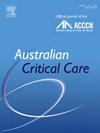“Because I couldn't understand and respond”: A mixed-method study examining the impact of language barriers on patient experiences of intensive care unit outreach team care
IF 2.6
3区 医学
Q2 CRITICAL CARE MEDICINE
引用次数: 0
Abstract
Background
Almost 10% of hospitalised patients experience acute deterioration requiring emergency intervention. Language barriers can impede patient assessment and health outcomes.
Objective
The objective of this study was to explore the experiences of adult inpatients whose preferred language was not English, who received care from the intensive care unit (ICU) outreach team.
Methods
An explanatory sequential two-phase mixed-method design was used. A retrospective audit was undertaken to explore characteristics of and outcomes for recipients of ICU outreach team care, according to preferred language. In phase two, interpreter-mediated interviews were conducted with former patients whose preferred language was not English to explore their experience of critical illness and care by the ICU outreach team.
Results
From 4234 inpatients who received care from the ICU outreach team in 2022, there was a mean of 3.54 episodes of care (1–565) per patient. Those whose preferred language was not English had a higher proportion of admissions from the emergency department and were more likely to have a medical emergency team call as their first outreach episode of care but less likely to be admitted to the ICU. Vietnamese and Mandarin were the next most common languages spoken after English. Twenty-two former patients or delegated relatives were interviewed. Not all recalled receiving care from the ICU outreach team. There was strong support for involvement of professional interpreters for critical conversations and to aid autonomy. Family members acted as lay interpreters and fulfilled familial and cultural obligations, but visitor restrictions impeded this.
Conclusion
Patient deterioration requires an emergent response. This research demonstrates the importance of identifying and overcoming language barriers for patients in a way that protects and preserves patient autonomy and ensures information accuracy. Where time and the patient's condition allows, use of professional interpreters must become the norm.
“因为我无法理解和回应”:一项混合方法研究,研究语言障碍对重症监护病房外展团队护理患者体验的影响
近10%的住院患者出现急性恶化,需要紧急干预。语言障碍会妨碍对病人的评估和健康结果。目的探讨非英语母语的成人住院患者在重症监护病房(ICU)外展小组接受护理的经验。方法采用解释性序贯两期混合法设计。根据首选语言,进行回顾性审计以探讨ICU外展团队护理接受者的特征和结果。在第二阶段,对首选语言不是英语的前患者进行口译介导访谈,以探索他们对重症和ICU外展团队护理的体验。结果在2022年接受ICU外展团队护理的4234例住院患者中,平均每位患者有3.54次护理(1-565)。那些首选语言不是英语的患者从急诊科入院的比例更高,并且更有可能在他们的第一次护理时被医疗急救小组呼叫,但不太可能被送入ICU。越南语和普通话是仅次于英语的第二常用语言。对22名前患者或委托亲属进行了访谈。并非所有人都记得接受过ICU外展小组的护理。对专业口译员参与关键对话和帮助自主的强烈支持。家庭成员充当外行翻译,履行家庭和文化义务,但访客限制阻碍了这一点。结论患者病情恶化需要紧急应对。这项研究证明了识别和克服语言障碍对患者的重要性,以保护和保持患者的自主权,并确保信息的准确性。在时间和患者条件允许的情况下,使用专业口译员必须成为常态。
本文章由计算机程序翻译,如有差异,请以英文原文为准。
求助全文
约1分钟内获得全文
求助全文
来源期刊

Australian Critical Care
NURSING-NURSING
CiteScore
4.90
自引率
9.10%
发文量
148
审稿时长
>12 weeks
期刊介绍:
Australian Critical Care is the official journal of the Australian College of Critical Care Nurses (ACCCN). It is a bi-monthly peer-reviewed journal, providing clinically relevant research, reviews and articles of interest to the critical care community. Australian Critical Care publishes peer-reviewed scholarly papers that report research findings, research-based reviews, discussion papers and commentaries which are of interest to an international readership of critical care practitioners, educators, administrators and researchers. Interprofessional articles are welcomed.
 求助内容:
求助内容: 应助结果提醒方式:
应助结果提醒方式:


